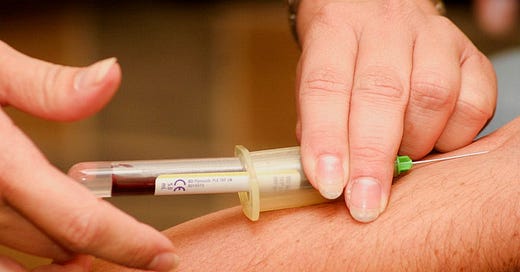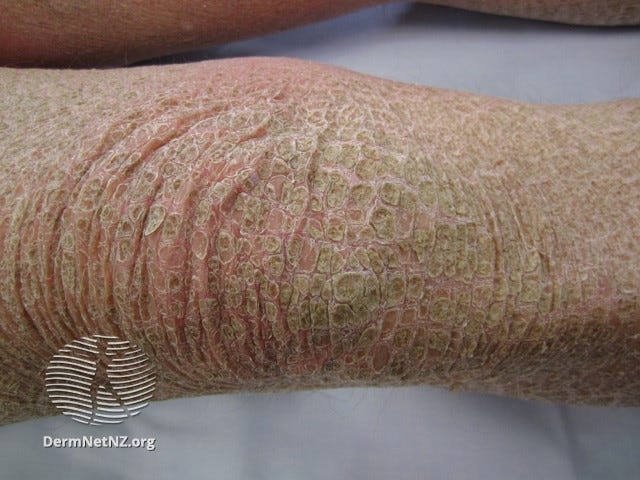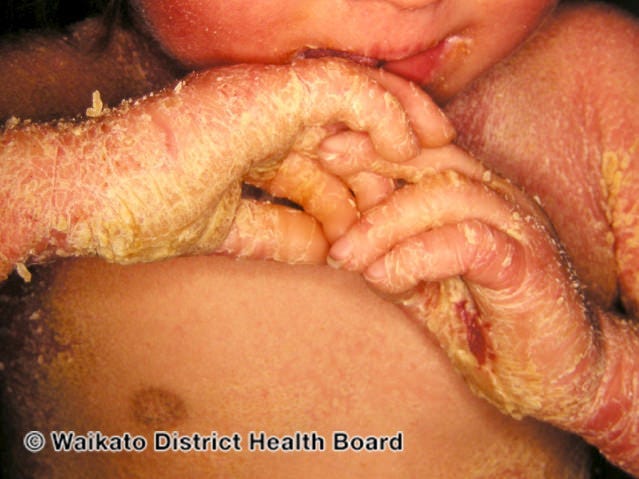I was born with a genetic mutation that causes epidermolytic ichthyosis (EI). It was previously called epidermolytic hyperkeratosis (EHK). I preferred it when it was named EHK because it was an easy abbreviation to remember (for dermatologists; no civilian knows what this means). I thought the “hyperkeratosis” part was very descriptive. EI rarely occurs, 1 in 300k births. According to a specialist in ichthyotic skin conditions, I saw decades ago. I have a severe case of this disorder.
EI causes my body to produce skin cells faster than usual, around 100x faster. Also, my skin cells don’t break down normally, so I have flakes and callouses. I get painful blisters on my feet from walking or wherever there is friction, as occurs during exercise.
The picture above shows why I am a hard stick. You can’t see veins on me anywhere. They have tried my arms, my legs, and my feet. Oddly, a sure place to get it in one is a specific spot on the back of my left hand.
IVs
I was fortunate that I didn’t have blood drawn that often when I was a child — or maybe I don’t remember. The older I get, the more often I’ve had to have blood drawn, just like most of us, I expect.
IVs are the worst, though. I think this is because anesthesiologists don’t believe me when I tell them I’m a hard stick and that even if I am, they are “professionals.”
Last year, my doctor put me in the hospital for a routine colonoscopy because, for every one of my prior colonoscopies, it took longer for the “surge center” staff to start my IV than it did to do the procedure. One of those times, I know it took over an hour and a half. To start the IV.
The hospital dropped the ball, and even though my doctor had requested an anesthesiologist to be there, he was about an hour late and only came after repeated pages. When he did arrive, I told him, “I am a hard stick. The last couple of times, they needed to use a portable ultrasound machine to find a vein.”
He was too young to think of it, but he might as well have said, “Pshaw.” Like so many before him, he asked if he could try it once first. I said yes, only because experience had taught me that if they didn’t get to stick me, they thought I was exaggerating.
After they got the ultrasound machine and started the IV, the anesthesiologist said, “You should tell folks ahead of time about this.” We were pals by then, so I said, “Dude! Are you fucking kidding me?” Everyone standing around laughed, and he looked chagrined.
Blood draws
Years ago, a pathology lab coordinator referred me to Vlad, the phlebotomist, when I was in line and told her I was a hard stick. She said something about him being amazing. Vlad is from Eastern Europe and may have been a doctor there.
Vlad is quiet and not chatty, even though I have been seeing him for blood draws for about fifteen years. He always gets it in one from the place on the back of my left hand. He asked me to remind him of the site. We get it all done.
Crip Manipulation?
I always call ahead to find out if Vlad is working before I go to the lab. When I arrived yesterday, I requested Vlad from the receptionist, who did not question my request. She said I might have to wait 25 minutes because Vlad had just left for lunch. It’s worth waiting, for sure.
I use a power wheelchair to get around, which is infinitely preferable to walking for me. I buzzed out into the hallway, and Vlad came in the doors from the parking lot simultaneously. He said, “Oh, hi.” I said, “Hi. I came to see you! I know you’re at lunch.” He kept walking.
I ran out to my van to put something in and then returned to wait. Vlad showed up in less than five minutes. I said, “Oh, I hope you didn’t come back early for me.” Vlad sort of nodded and shrugged at the same time.
Got it in one.
This story was previously published on Medium. I think it is very descriptive of my disability. Incidentally, being a “hard stick” is an aspect of my disability that most “disability advisers” wouldn’t know or guess without input from me. It is a good illustration of the necessity of being a good self-advocate. Or the need to have a friend, family member or hired professional to accompany the disabled person in medical scenarios to make sure those extra and unnecessary discomforts can be avoided entirely.






